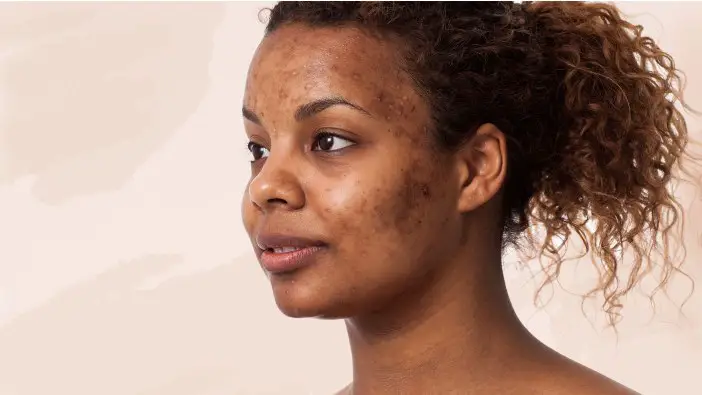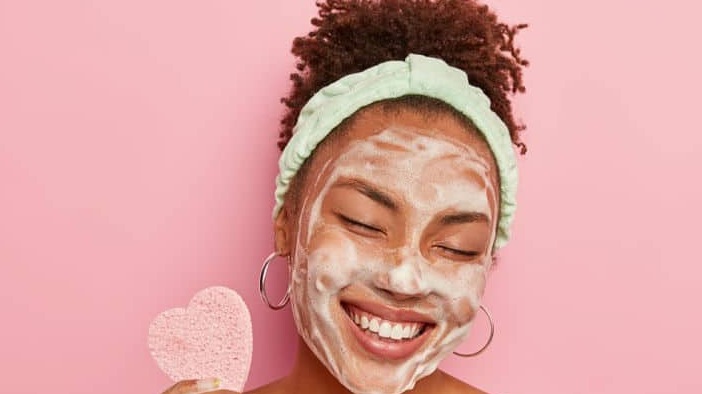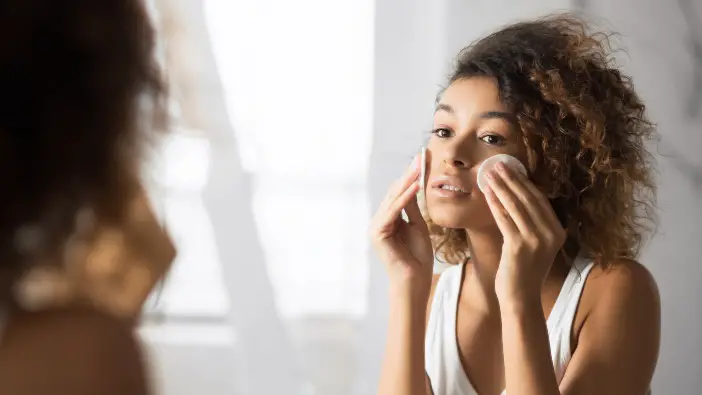Acne is a common skin condition that affects many adolescents and young adults with women being a major population. If you have acne or acne-prone skin, it is only normal that you receive acne skincare routine suggestions now and then.
Some of these suggestions include the use of certain medications, topical treatments, and even certain diets; all these could be overwhelming. But, acne skincare doesn’t have to be anything complex or uncomfortable.
Ahead, you’ll find out what skin experts have to say about acne and how to care for acne skin.
SEE: Does Drinking Water Help Your Skin? Here’s What You Need To Know
What is Acne?

Treatment is only effective when you have a detailed knowledge of what needs to be treated. Acne is a skin condition that occurs when your hair follicles become clogged with oil and dead skin cells.
Acne usually occurs during puberty. This is when the skin’s sebaceous glands become stimulated by the hormones of the adrenal gland. Consequently, they produce oil and lead to skin breakouts like pimples on different parts of the body.
Viseslav Tonkovic-Capin, MD, a dermatologist explains that when skin pores get clogged with dead skin cells and oil and accumulate under the skin, it becomes a perfect environment for Propionibacterium acnes to breed and cause inflammation that leads to pimples.
The face is the commonly affected skin area. But, some people get pimples on their backs, necks, shoulders, or chest area. Pimples are not the only form of appearance of acne. Whiteheads, blackheads, pustules, and cysts are the other forms of acne appearance.
Why Do I Have Acne?
There are several reasons why you have acne breakouts. Generally, people with oily skin are the most susceptible to acne. But, why do people with other skin types have acne breakouts?
One or more of these could be the reason why you have acne.
- Rise in the levels of hormones like androgen during puberty
- Dead cells and oil-clogged skin pores
- Genetics
- Emotional stress
- Menstruation in women
- Oil-based cosmetics
- Medications like birth control pills or corticosteroids
- Diets like carbohydrates and oil-rich foods
- Skin inflammation and bacteria
See Also: This Is the Right Skincare Routine Specially Designed for Oily Skin
Acne Skincare Routine
Acne skincare routine is not supposed to be exhausting or time-consuming before you get results. Brendan Camp, MD, says, “While there may be no one-size-fits-all regimen, building a foundational skincare routine that can be modified to suit a person’s needs is a good place to start”
For acne-free skin, incorporate a regular daily- morning and evening, and a weekly skincare routine. These routines are simple and have been found effective. However, you must be ready to commit to consistent practice.
1. Daily Acne Skincare Routine

Acne Skin cleansing
A perfect morning acne skincare routine begins with a face wash and cleansing. Use your fingertips or a clean, soft washcloth to wash your face. Make sure you’re using a mild soap too; soaps that contain harsh chemicals will only cause more irritations.
After that, your face cleansing comes next. “Using overly harsh cleansers can actually lead to more breakouts”, Dr. Shari Marchbein. Your choice of cleanser should one that is hydrating and fragrance-free.
Cleansers that are tagged “acne cleansers” are most times too harsh for the face. Also, they contain too many detergents that strip your skin of its essential fats. As a result, instead of healing acne, your skin is left irritated, tight, and susceptible to more breakouts.
A cleanser like Cetaphil Gentle Skin Cleanser is hypoallergenic and does not contain fragrance. It keeps the skin on your face hydrated, removes excess oil and dirt, and fights acne-causing bacteria. And, it does not remove your natural skin barrier.
After the day’s running around, wash your face to get rid of makeup and the oil produced during the day. Use Cetaphil daily cleanser as you did in the morning. It contains rejuvenating properties to keep your skin refreshed.
Most importantly, your acne skin does not need comedogenic products, products that leave residues and block your skin pores.
SEE: How To Treat Benzoyl Peroxide Burn on Acne
Toners/Astringents
Follow skin cleansing with a toner or astringent to clean your pores. Toners or astringents contain ingredients that can penetrate the pores and get rid of sebum. The ingredients include acids like salicylic acids, lactic acid, and glycolic acid.
These acids penetrate your skin pores and unclog them of oils and dead skin cells that cause breakouts. Experts reveal that these acids can break the existing bonds between dead skin cells and your skin surface. Also, they have exfoliating properties that minimize acne scars.
Applying toner is no much work. All you need to do is dampen a cotton pad with toner or astringent and swipe gently across your face to wipe off grime, oil, and dirt. They get absorbed into the skin and work from the inside out.
Repeat this process in the evening after cleansing. It helps to remove residues of oil, grime, dirt, and makeup. In addition, toners or astringents prep your skin to absorb subsequent skincare products.
However, if you have dry skin, it is advisable you use toners instead or astringents. Oily skins, on the other hand, respond better to astringents. You should also be sure that the alcohol concentration is minimal to avoid further irritations.
Paula’s Choice Skin Balancing Pore-Reducing Toner is a lightweight toner that keeps the skin hydrated. It also protects your skin from antioxidants which can lead to acne breakouts.
See Also: A Complete Guide On How to Use Face Toners Effectively
Serum
Serums rebalance your skin pores after the purifying and exfoliation action of cleansers and toners. They are the first step to restoring moisture to your skin. Serums are very active repairers of free radical damage, especially vitamin C serums.
Dr. Marchbein further says that vitamin C serums can help to lighten pigments and the dark spots that acne can leave behind. Vitamin C has anti-inflammatory properties that help to reduce the redness and swelling that characterizes acne breakouts.
CeraVe Vitamin C Serum contains L-ascorbic acid, hyaluronic acid, and other heavy-lifting ingredients. Therefore, it protects and restores the skin from free radical damage. Also, it improves skin tone and texture that may have been distorted by acne.
Because acne skin does not need fragrance, paraben, or comedogenic products, this vitamin C serum is a perfect choice for you. This vitamin C serum is also safe for evening use.
Vitamin C is at the peak of its skin repairing function when you sleep. So, it’s just appropriate to use the serum at this time. Also, you are not exposed to the risk of photosensitivity which may occur during the day.
Acne Skin Treatment Cream
The next step for your daily acne skin care routine is to apply an acne treatment cream on the pimples or dark spots. Besides, formally treating acne, the cream helps to prevent irritations that may arise due to the action of toner or retinol in the serum.
In addition, applying it at this stage allows the cream to work effectively because any barrier that may obstruct its penetration has been removed. Apply acne treatment creams that are prescribed by your doctor or an over-the-counter acne gel or cream.
If you’re going for OTC creams, look for creams that contain benzoyl peroxide and retinoids like tretinoin and adapalene.
Moreover, acne treatment creams or gels do not obstruct your face makeup during the day. However, you have to be sure that you’re not using greasy makeup products that can expose your skin to acne cosmetica, that is, acne caused by makeup products.
Read Also: Best Acne Treatment
Moisturizer
Moisturizers are very important to your daily acne skincare routine. Acne treatment creams tend to dry out the skin. As a result, your oil glands produce excessive oil to compensate for dehydration. This can lead to clogged pores and reverse the previous efforts.
“Facial washes and toners remove natural oils, so skipping this step will leave the skin dry, vulnerable to infection, and dull in appearance”, says Dr. Camp.
Your choice of moisturizer should be lightweight, oil-free, hydrating, and will not clog your pores. CeraVe’s Moisturizing Cream contains hyaluronic acid that keeps your skin hydrated and humectants like glycerine that helps to retain moisture.
Also, it contains three essential ceramides that help to protect your skin’s natural lipid barrier. If you have dry skin, opt for a moisturizer with a lotion formula. On the other hand, a gel-based moisturizer is best for oily skin.
In the morning and at nighttime, apply your moisturizing cream around the acne treatment cream and allow it to absorb into your skin.
Read Also: Are Serums Moisturizers? Similarities and Differences Between Serums and Moisturizers
Sunscreen
Sunscreen is the seal to your morning skincare routine. Why is sunscreen part of my acne skincare routine? Experts have found that frequent exposure to the sun’s UV can worsen acne, dark spots, and cause skin inflammation.
The exfoliating ingredients from cleansers and toners, and acne treatment creams make your skin prone to sun damage. And, too much of the sun’s UV rays can break down the skin barrier.
A sunscreen like Neutrogena Clear Face Oil-Free Sunscreen has a lightweight formulation. It is also oil-free, non-comedogenic, with SPF 55. This cream also provides broad-spectrum protection against rays that cause skin damage and rays that cause cancer.
Rather than an all-over sunscreen, go for a facial sunscreen which is less likely to be oily and contain fragrance. Additionally, if your moisturizer contains SPF, you can skip the sunscreen. If otherwise, slather some sunscreen on your face.
You do not need sunscreen at night unless your moisturizer contains SPF.
2. Weekly Acne Skincare Routine

Exfoliation
Exfoliants that contain alpha- and beta- hydroxy acids (AHAs & BHAs) help to get rid of dead skin cells. This process also dislodges sebum from the skin pores; consequently, reducing acne breakouts.
There are physical and chemical exfoliants for skin exfoliation. However, dermatologists advise against using physical exfoliants. They tend to be aggressive on the skin and cause irritations that can lead to more breakouts.
So, you’d rather get a chemical exfoliant prescription like Paula’s Choice Skin Perfecting 2% BHA Liquid Exfoliant. It contains salicylic acid (BHA) which unclogs pores and at the same time hydrates your skin.
Most importantly, you should use exfoliants two to three times a week so you do not exfoliate. Otherwise, you may just be exposing your skin to what you’re supposed to be treating. And, you should exfoliate acne with a skin expert’s guidance.
Unclogging Pores
As mentioned earlier, acne breakouts are a result of pores that are clogged with oil and dead skin cells. In cases of adult and persisting acne, unclogging pores might be necessary.
But, you shouldn’t do this independently. See a dermatologist who will ask you a few questions, prescribe a method and carry out the process.
Learn More: Get Your Acne-Free Skin With a Facial Steamer
Other Tips for Acne Skincare Routine

- Resist the urge to scrub your skin when washing or exfoliating
- Do not pick at acne scars or pop the pimples
- Wash your face at least twice a day and use a moisturizer afterward
- Stay away from beauty products that contain alcohol
- Drink a lot of water and eat well
- Always rinse your face with lukewarm water
- Always apply skincare products with clean hands
- Commit to your skincare routine
- Avoid frequent exposure to the sun’s UV and avoid skin tanning
- Use the right makeup products
- Learn the habit of washing off makeup before going to bed
- American Academy of Dermatology advises that you change your bedsheets weekly
- Get beauty sleep
- Always remember to see a dermatologist
SEE: The Benefit of Aloe Vera on Face to Improve Skincare Goals
FAQs on Acne Skincare Routine

Is there a difference between acne and pimples?
Yes, there is. The difference is in their definition. Acne is a skin condition where the hair follicles and oil glands are blocked with sebum and dead skin cells. And, a pimple appears as one of the symptoms and determiners of the severity of acne breakouts.
Why do I have recurring acne after acne treatment?
You may have recurrent acne due to factors like puberty, genetics, a new skincare product, hormonal changes, stress, and inconsistent practice of acne skincare routine. Also, if you stopped using an acne treatment cream, it can cause recurring acne after some time.
Can my diet be the cause of my acne?
Yes, it could. If your diet largely contains foods like soda, rice, milk, and any other food that is rich in sugar, you’re at a predisposition to acne breakouts. These foods can cause inflammation and an increase in oil production in the skin.
Conclusion
The acne skincare routine is one of the most sought-after skincare routines, especially among women. Sometimes, acne breakouts are a result of factors we can influence, and sometimes, nature has to take its course.
However, while it remains, consistently follow your acne skincare routine to get results. Do not expect overnight results or switch skincare products when you think one isn’t working. You need to be patient with your skin.
Also, the nature of acne skin does not require a lot of products, so you can equally use your morning acne skincare products at night. It’s good for your skin and your pocket.
Thanks for reading.
Read more relevant skincare and wellness articles on Africana Fashion.







